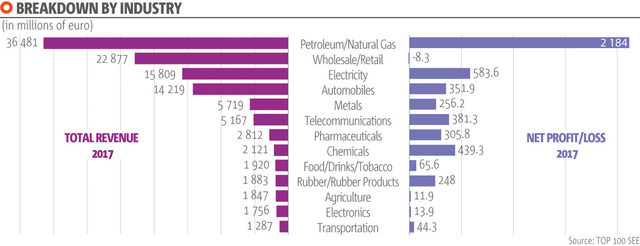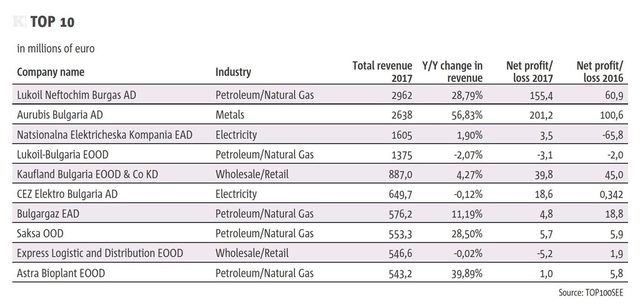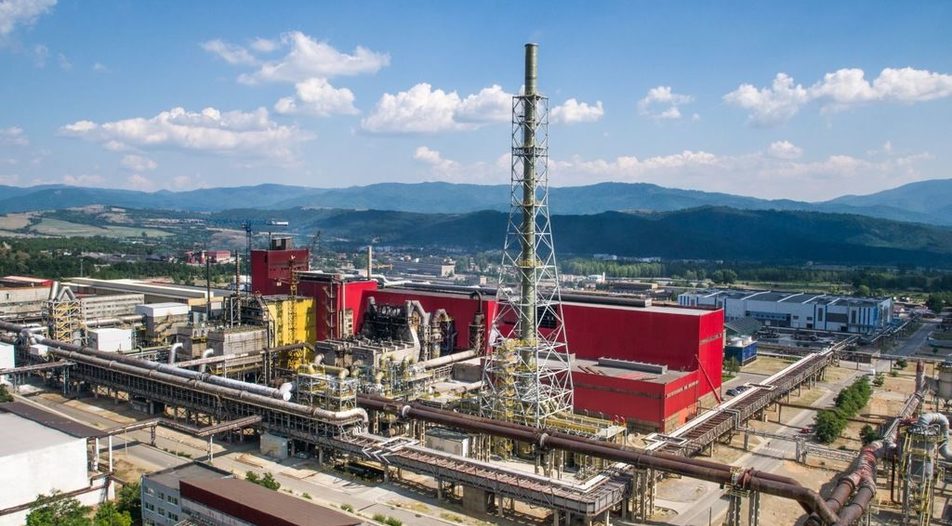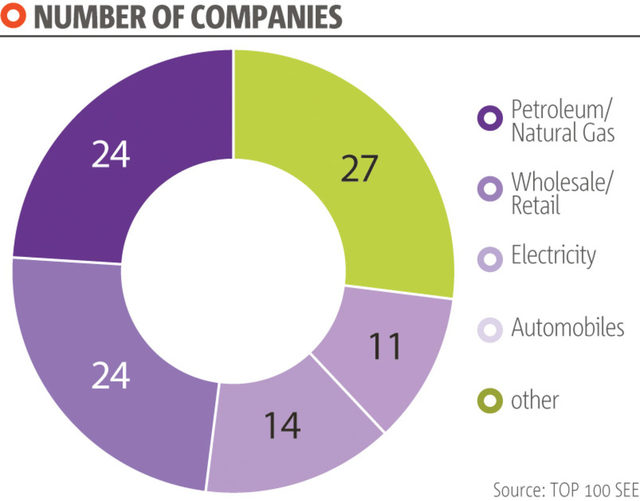The biggest companies in Bulgaria booked record-high revenues and profits in 2017 in lockstep with their peers in Southeast Europe (SEE), as rising consumption boosted economic growth across the region, according to the latest edition of the SEE TOP 100 ranking.
The SEE TOP 100 annual ranking published by business intelligence provider SeeNews comprises the biggest companies by total sales in Albania, Bosnia and Herzegovina, Bulgaria, Croatia, Macedonia, Moldova, Montenegro, Romania, Serbia and Slovenia. Bulgaria has the fifth largest number of entrants in this year's edition, ten. Their combined turnover rose to 12.337 billion euro, from 9.993 billion euro of the nine Bulgarian-based companies that made it into the ranking a year earlier, whereas their profit more than doubled to 421.8 million euro.
The strong performance of the companies based in Bulgaria, like elsewhere in SEE, comes on the back of expanding private consumption underpinned by growing disposable incomes, which propelled economic growth in the region to 4.0% in 2017. The healthy performance of the economies in the EU, the region's main trade partner, and low loan rates brought further ease for businesses.
As economic activity picked up, the total revenue and profit of the 100 entrants in the SEE TOP 100 ranking both reached all-time high values - 113.9 billion euro and 4.9 billion euro, respectively.
The upturn is largely due to a recovery of the oil and gas sector, to which about a quarter of all entrants in the ranking belong, and a strong performance by the metal companies on the back of a rise in global commodity prices and increased demand from other industries. Bulgaria is no exception - five of its entrants operate in the oil and gas industry, including two newcomers to the ranking.
The robust combined results of the Bulgarian entrants are largely due to the strong performance of oil refinery Lukoil Neftochim Burgas, copper smelter Aurubis Bulgaria and state-owned power supplier Natsionalna Elektricheska Kompania (NEK).

EXPORT-ORIENTED, FULLY INTEGRATED
Half of all entrants in this year's edition of SEE TOP 100, including Aurubis Bulgaria, are foreign-owned. Foreign ownership helps local companies avoid many of their domestic problems while giving them access to international markets and supporting their investment plans.
Aurubis Bulgaria, a unit of Hamburg-based copper producer Aurubis and Bulgaria's biggest exporter, contributes 9% of Bulgaria's exports.
Most of the top companies in SEE enjoy the economies of scale provided by the full integration of activities within their line of operation. For example, Groupe Renault Romania, the parent company of SEE's biggest company Dacia, integrates all activities specific for a car manufacturer. The integration has generated a steady economic performance and a wide range of job offers in different fields: market studies, design, engineering, technical research, manufacturing and supply chain, sales and aftersales, business services and financing.
Like Dacia, Aurubis Bulgaria is part of the integrated group of production units of Europe's biggest copper producer and part of its output goes to the markets within the group, mainly to Belgium and Italy. Furthermore, the Aurubis plant in Luenen, Germany, is the world's biggest recycler of copper scrap metal, which gives the Bulgarian company a competitive edge as it aims to expand in the recycling market.
Large-scale investments are another common feature of the operations of the top companies in the region. Apart from investing in capacity expansion, a growing number of companies are recognizing the importance of spending on circular business models, as well as on research and development (R&D). Aurubis Bulgaria is no exception: since 1997, the company has invested over 1.2 billion levs in technical upgrades and environment protection. Its financial results reflect a sharp increase in output in 2017 after a major shutdown of its plant for capacity upgrades a year earlier.
"We are investing in research and development. Our R&D units in Hamburg and Pirdop are exploring together the opportunities for more efficient extraction of metal from cоncentrate. We are searching for possible uses of slag such as iron silicate. We want to expand our positions on the recycling market. [] Complex metallurgy and circular economy are the future," Aurubis CEO Tim Kurth says.
ROOM FOR GROWTH
While all Bulgarian entrants in this year's edition come from sectors that traditionally dominate the ranking, it is worth noting that Bulgaria has no representative in a key sector that is thriving in the region - cars and car parts manufacturing.
Car manufacturing is the fourth biggest industry in SEE, generating a combined revenue of 14.2 billion euro and a net profit of 351.9 million euro in 2017. Furthermore, Romania's Automobile Dacia, a unit of France's Renault, is the biggest company in SEE for a fourth year running with revenue growth of 11.62% to 5.0 billion euro.
Since 2007, when SeeNews started compiling SEE TOP 100, the annual revenue of all car and car parts makers in the ranking has increased 140% - a growth rate unmatched by any other industry in the region. The automotive sector is among the most rapidly expanding industries in all countries in the region in terms of contribution to GDP, production capacity, new investments and jobs.
Benefiting from growing demand both at home and outside the region, the automotive sector attracts investors with low cost of plant construction, land and services, significant state subsidies and the region's proximity to key markets. Last but not least, SEE, in particular the countries with traditions in car manufacturing such as Romania, Serbia and Slovenia, boast a wide base of highly skilled workers. In Romania, for example, 15 universities offer automotive-related curricula.
In Bulgaria, the sector has attracted a large amount of foreign investment over the past years, too, but no Bulgarian car parts manufacturer has yet crossed the threshold for entry into the ranking set at 515.5 million euro in this year's edition of SEE TOP 100.
Another sector conspicuously absent from the ranking of the biggest companies by revenue in both Bulgaria and SEE is IT, even though it is one of the key drivers of the country's economy, creating thousands of jobs and generating major M&A deals over the past years. Still absent from the ranking is also private healthcare despite its rapid development over the past years and huge potential in view of the deteriorating demographic picture in the region and the poor state of public healthcare services in most countries.
However, a look at the companies that remained just a step away from entry into the ranking, both from Bulgaria and across the region, gives no reason to expect a change in 2018. The 10 Bulgarian companies that remained below the threshold for inclusion in this year's edition of SEE TOP 100 operate in the same sectors as this year's entrants, with the exception of two telcos.
METHODOLOGY
SEE TOP 100 ranks the biggest companies in Southeast Europe by total revenue for the fiscal year ended December 31, 2017. Both 2017 and 2016 comparative figures are sourced from 2017 annual non-consolidated reports. The SEE TOP 100 ranking covers non-financial companies registered in Albania, Bosnia and Herzegovina, Bulgaria, Croatia, Macedonia, Moldova, Montenegro, Romania, Serbia and Slovenia.Banks, investment intermediaries, insurers and real estate investment trusts (REITs) are excluded from the ranking as total revenue is not an accurate indicator of their performance. Holding companies, on the other hand, are represented in the ranking by their subsidiaries. All data is sourced from national commercial registers, stock exchanges, government and corporate websites, industry regulators, local business information providers and companies themselves. The initial pool of companies exceeded 2,900.
The ranking does not include companies that declined or failed to provide financial results by the time SEE TOP 100's content was finalised. To allow comparison, all local currencies in the rankings have been converted into euro, using the respective central bank's official exchange rate on the last working day of 2017 and 2016. Local currency figures referencing past periods have been converted into euro using the respective central bank exchange rate as of the end of the relevant period while all other local currency figures have been converted using the exchange rate as of the date the relevant editorial content was finalised.

The biggest companies in Bulgaria booked record-high revenues and profits in 2017 in lockstep with their peers in Southeast Europe (SEE), as rising consumption boosted economic growth across the region, according to the latest edition of the SEE TOP 100 ranking.
The SEE TOP 100 annual ranking published by business intelligence provider SeeNews comprises the biggest companies by total sales in Albania, Bosnia and Herzegovina, Bulgaria, Croatia, Macedonia, Moldova, Montenegro, Romania, Serbia and Slovenia. Bulgaria has the fifth largest number of entrants in this year's edition, ten. Their combined turnover rose to 12.337 billion euro, from 9.993 billion euro of the nine Bulgarian-based companies that made it into the ranking a year earlier, whereas their profit more than doubled to 421.8 million euro.













